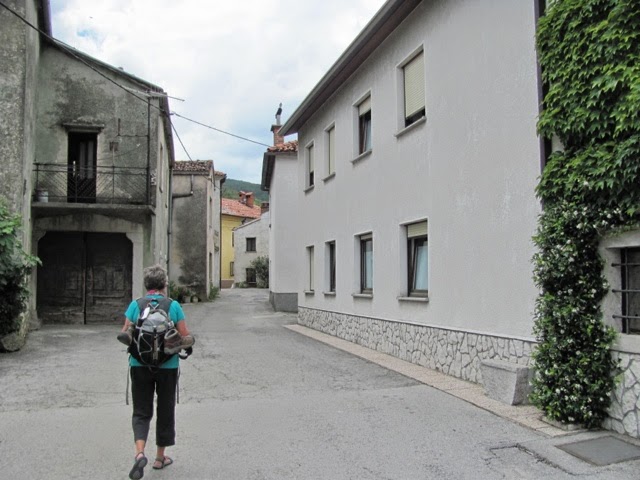Day 4 : Hudicevec to Slap (7 hours walk)
The ups and downs of our walk today
Weather : 22o, fine and windy
Yesterday we were disappointed with the modified walk and commercialised accommodation but today the route came up in spades! We were able to walk from one destination to the other, door to door, with a variety of scenery and even coffee at a cafe for lunch to help digest the huge prosciutto and cheese sandwiches, in mild weather. It rated with some of the best days walking in Italy on 2008. 7 hours concentrated walking on wooded tracks, side roads, through villages and vineyards with spectacular views down the Vipava Valley - few sore toes but such an inspirational day.
Mark caught a glance of a stork out of our window this morning.
After breakfast set off towards Mt Nanos where we skirted along the foothills for several hours.
It was a bit of a climb but it was shaded with a leafy canopy and well sign posted.
Much of the way-marking today coincided with the yellow arrows and scallop shells of the Zagreb to Trieste Camino de Compostella Route. Only 3 hours by car and 14 days on foot. This area is in pristine condition not affected by the February ice storm as around Postojna further north.
We caught a fleeting glance of a deer
Emerging from the forests on Mt Nanos foothills we discovered we were in the Vipava Valley, a major wine growing and agricultural area.
After a welcome coffee in Podnanos (unusual to find any cafés in small villages) we set off through the little hamlet of houses, set cheek by jowl and individually numbered. We exited from number 51.
Just outside Postnanos there were orchards and grapevines aplenty. We found ripe figs!
And sweet, sweet cherries
Most of the houses have stones on their roofs to hold the tiles in place when the strong north-east wind, the burja, blows. It is so strong that in winter it can stop road traffic.
The valley is planted with vines on both sides.
Green, lush vegetation. This is the view towards the village of Goce.
Beehives found in various sections of our walk. Slovenian Karst honey is a specialty.
Goce has an interesting history. It is densely settled because in the eighteenth century it was governed by the church and the locals were exempt from being conscripted into the army. It opposed the Fascists in WW2 and suffered for it, there is a memorial for those who gave their lives. Most now grow grapes or crops around the village. Houses are adorned by beautiful flowers - roses, lillies, geraniums.
We walked into the precinct of the church of St Andrej, the organ was playing but the door was shut and the grounds were exquisite. A very loved community church.
As well as excellent wines (Merlot, Zelenograd, Rebula, Tokaj, Malvazijz) farmers grow corn and potatoes. We've had a delicious red wine from this region called 'teran', as a full-bodied wine, a grappa and as a sauce accompanying beef.
Our farmstay tonight was the very first farm as we entered the village, Tourist Farm Na Hribu.
www.nahribu-zorz.veha.net
A very satisfying day. Varied walking, scenery and villages. We enjoyed moving on to another region and felt we had made progress along the route.
M&M
17/6/2014



















2 comments:
It looks divine. Wish we were there.
Love the mix of lush green countryside and interesting ancient buildings! Be sure to try all the local food and wine...you will need the energy.
Post a Comment